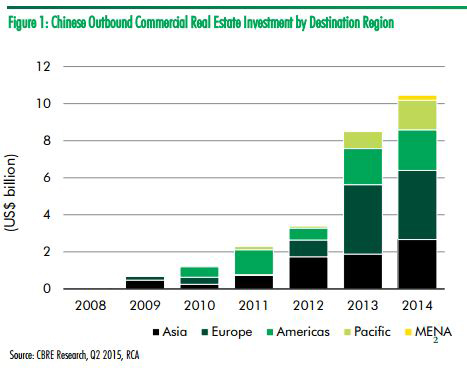The WPJ
THE WORLD PROPERTY JOURNALReal Estate Facts Not Fiction
Commercial Real Estate News

Despite China Stock Market Volatility, Outbound Property Investment Grows
Commercial News » Shanghai Edition | By Michael Gerrity | July 27, 2015 10:30 AM ET
While China's stock market has been experiencing record drops and whipsaw volatility in 2015, China driven outbound capital flows to commercial real estate in last four years experienced a compound annual growth rate (CAGR) of approximately 72% to reach over $10 billion for the year 2014. This is according to CBRE's recently published report, The Expanding Role of Chinese Capital in Global Real Estate Markets.
 This is the first time annual flows have exceeded the $10 billion mark. China also accounted for over a quarter of total outbound commercial real estate investment from Asia during 2013 and 2014.
This is the first time annual flows have exceeded the $10 billion mark. China also accounted for over a quarter of total outbound commercial real estate investment from Asia during 2013 and 2014.What began with China's sovereign wealth funds (SWFs) and tier-one insurers purchasing high-profile trophy assets abroad has now spread to acquisitions by mid-tier insurers and corporate investors. Meanwhile, Chinese real estate developers have also been quite active, expanding into overseas markets in a bid to meet increasing demand from mainland HNWIs for residential assets in key destinations.
The rapid rise of Chinese capital
Frank Chen, Executive Director and Head of CBRE Research, CBRE China, commented, "the past two years have seen an explosive growth in purchases of offshore real estate by Chinese investors including HNWIs, corporations and institutional investors. Each of the groups, however, is driven by a different set of motivational factors. For mainland HNWIs, the purchase of offshore residential property often ties in with the desire to support the overseas study of their children and is in preparation for intended immigration. For Chinese developers, the main drive to purchase offshore property is not simply to establish office premises for global expansion, but rather to meet increasing demand from mainland HNWIs for residential properties in key offshore destinations. For mainland institutional investors, the main motivation for offshore property investment is to obtain access to a wider array of attractive investment opportunities and diversify a growing pool of domestic wealth.
Capturing opportunities in key offshore markets: UK, US and Australia
CBRE's Global Investor Intentions Survey 2015 revealed London as the most preferred city for investment amongst global investors seeking to purchase commercial real estate assets. With a large and liquid real estate market, as well as a transparent, relatively stable and highly developed market environment, London has drawn wide-spread enthusiasm from global investors. Real estate acquisitions in London accounted for approximately 80% and 52% of total China-sourced commercial real estate investment flows to Europe in 2013 and 2014, respectively. Even as yields in gateway cities across the globe continue to compress, they are likely to remain comparatively attractive in London; national employment figures for the UK are at a multi-decade high and forecasts of stable economic growth are expected to support the strong performance of local property markets over the next few years.
US-bound flows accounted for over a fifth of total outbound investment from China in 2013 and 2014, the majority of which has gone to hotel and office assets in gateway cities. Over the two-year period, purchases of hotel and office assets in New York, Los Angeles, Chicago, Houston and San Francisco accounted for over 60% of US-bound capital to commercial real estate, with purchases of premium office and hotel assets in New York and Los Angeles comprising approximately half of the total.
While the high level of Chinese investment into the US and the UK is due in significant part to the size of each nation's respective economy and international financial centers, Australia has instead relied largely on the strength of its commercial ties with China, its largest trading partner. In 2014, China rose to become the second largest foreign purchaser of commercial property in Australia, behind only Singapore, with properties in Sydney the most attractive to Chinese investors.
Offshore investment is certainly not without its risks
Initial purchase activity from mainland investors has largely focused on residential, premium office and hotel assets in gateway cities. As they gain experience and become more confident in overseas real estate investment, we expect that more and more investors will start to look for investment opportunities across a wider range of geographies as well as across a greater variety of asset types. For example, as the pressure on property prices in gateway cities in the US continues to increase, mainland investors will need to include other large metropolitan areas, such as Atlanta, Boston, Dallas, Denver and Seattle, in the hunt for better investment opportunities. In the meantime, a number of mainland developers have already begun to foray into retail and other property types. Some institutional investors are also beginning to take note of the attractive returns offered by industrial and logistics properties.
That said, the ample supply of global investment opportunities is matched by a number of new challenges. Regulators in offshore markets may roll out new regulatory restrictions and requirements for foreign purchasers of real estate, as well as implement new policies complicating the landscape for all market participants. Given the cyclical nature of real estate investment, the strong performance of global property markets in recent years will invariably be followed by market downturns in varying degrees across regions and property types. Mainland investors will thus need to prepare for these and other challenges as they continue to build their global portfolios.
Given many Chinese investors have little experience investing in offshore real estate, navigating unfamiliar market and regulatory landscapes may prove to be the most significant challenge. Marc Giuffrida, Executive Director, Global Capital Markets, commented, "While allocation is global, success in real estate is still local. Over the last three years, we have observed that the most successful Chinese investors are those who get local quickly, either through retaining a global advisor, forging local partners, or building a local team. Understanding regulations, market fundamentals and business practices is key; as competition for assets increases, having a strong local presence improves the ability to secure good opportunities through greater sourcing and being able to underwrite in an accurate and timely manner."
Sign Up Free | The WPJ Weekly Newsletter
Relevant real estate news.
Actionable market intelligence.
Right to your inbox every week.
Real Estate Listings Showcase
Related News Stories
Commercial Real Estate Headlines
- U.S. Commercial Mortgage Originations Spike 27 Percent in Q2 Over Q1
- Phnom Penh's Commercial Office, Retail Markets Face Slowdowns in 2024
- Global Edge Data Center Market to Hit $300 Billion by 2026
- Commercial Property Transactions in Japan Dive 25 Percent Annually in Q2
- Delinquency Rates for U.S. Commercial Property Loans Downticks in Q2
- Megawarehouse Lease Deals in U.S. Increase in 2024
- Office Tenants' Flight to Quality Buildings Increases in 2024
- Commercial Lending in Japan Upticks 6 Percent Annually in Q1
- AI Driving Significant Global Data Center Growth in 2024
- Total U.S. Commercial Mortgage Debt Rises to $4.7 Trillion in Q1
- U.S. Commercial Mortgage Delinquencies Rise in Early 2024
- Asia Pacific Office Sector to Further Reprice Throughout 2024
- U.S. Retail Foot Traffic to Surpass Pre-Pandemic Levels by 2025
- Commercial Real Estate Lending in U.S. Slowed in First Quarter
- Japan Commercial Property Investment Volume Jumps 7 Percent in Q1
- Asia Pacific Commercial Property Investment Leads the World, Spikes 13 Percent
- Driven by High Rates, U.S. Commercial Lending Imploded 47 Percent in 2023
- After Two Year Slump, Prime Multifamily Metrics Uptick in U.S.
- Commercial Co-Broker Commissions Not Affected by NAR-DOJ Settlement, Yet
- U.S. Office Buildings with Upscale Tenant Amenities Still Enjoy Premium Rents in 2024
- U.S. Commercial, Multifamily Mortgage Delinquency Rates Uptick in Q4
- U.S. Commercial Mortgage Debt Continued to Rise in 2023, Hits $4.7 Trillion
- Nonresidential Construction Spending in the U.S. Falls Sharply in January
- U.S. Multifamily Construction Starts to Decline in 2024
- Commercial Mortgage Lending in U.S. Shows Signs of Stabilization in Late 2023
- Architecture Billings Decline in December as Soft Business Conditions Persist
- Government Sector Claimed Largest Portion of 100 Biggest U.S. Office Leases Signed in 2023
- U.S. Commercial, Multifamily Borrowing Dives 25 Percent Annually in Late 2023
- Record High Multifamily Construction Deliveries Drive Vacancy Rates Higher
- Commercial Property Investment in Japan Implodes 57 Percent Annually in Late 2023
- Green Energy Companies Flocking to New York City Office Space
- Asia Pacific Commercial Property Investment Upticks 3 Percent in Q4
- U.S. Commercial, Multifamily Borrowing to Hit $576 Billion in 2024
- Japan is Top Cross Border Commercial Property Investment Target in 2024
- U.S. Delinquency Rates for Commercial Properties Increased 6 Percent in Q4 of 2023
- Commercial Property Investment in Japan to Weaken in 2024
- Office Landlords Nationwide Increasing Concessions to Lure Tenants in U.S.
- Hong Kong's Commercial Property Market Faces Ongoing Challenges in 2024
- Online Returns in the U.S. Could Total $82 Billion This Holiday Season
- More Pain Expected in 2024 for America's Commercial Property Sector
Reader Poll
Marketplace Links
This website uses cookies to improve user experience. By using our website you consent in accordance with our Cookie Policy. Read More





